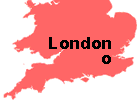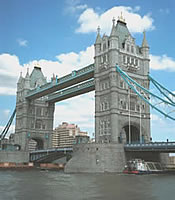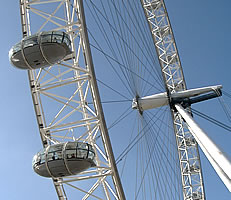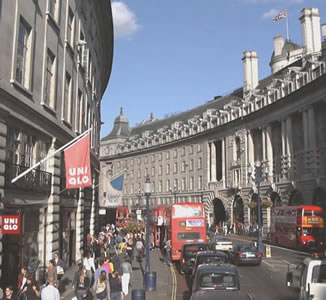

|
|
Study, work or travel in the UK. British
culture and life.
|
|
||
|
|
|
|
||
 |
||||
|
|
|
|
||
|
|
||||
 |
||||
|
A guide to London
|
||||
|
Sections:
|
Summary |
 |
| Facts & figures | ||
| Features | ||
| Environment | ||
| Entertainment | ||
| Transport | ||
| Further information | ||
| Links |
 Tower Bridge |
 London Eye |
 |
"Time
Out" Student Guide 2003/2004 |
 |
The
London Bible (guide to living and working in London) Authors: Katherine Harlow, Katya Holloway Publisher: Summersdale Publishers Date: October 2002 |
 |
London (guide book for tourists) Author: Peter Matthews Publisher: Pitkin Guides Date: June 2000 |
 |
A-Z
London Street Atlas (Spiral) (street map) Publisher: Geographers' A-Z Map Company Date: November 2002 |
 |
"Time
Out" London Visitor's Guide: 2003/2004 (guide book for visitors to London) Editor: Ruth Jarvis Publisher: Time Out Magazine Date: March 2003 |
 |
Living
& Working in London (book for people working in London) Author: Orin Hargraves Publisher: Kuperard Date: June 1997 |
| Subject | Name |
| Population: | 7,187,400 (over 60 years old: 16.8%) |
| Region: | Greater London (in south England) |
| Location: | See: map |
| Visiting from abroad: | There are 5 international airports around London: Heathrow,
Gatwick, City, Luton, Stansted (see: Travel/Transport/Air) Eurostar trains run from Brussels and Paris to London Waterloo station |
| Tourism: | The most popular town in the UK for overseas visitors in 2000 |
| Language schools: | 80 schools which are recognised by the British Council (2002) |
London is a large, busy city and therefore has some problems such as noise, air pollution and traffic congestion. However, there are more green spaces than in most capital cities. It is generally safe to walk alone at night in busy areas with good lighting, but it is a good idea to carry a personal alarm, especially for women walking alone at night. Crime rates are quite high in central London. Foreigners are often targeted by thieves: look after your money, mobile phone or other belongings carefully, especially in busy stations or shopping areas. Most people feel safe enough walking around the city by themselves, but women walking alone at night might choose to carry a personal alarm and avoid dark streets. There is some homelessness and begging. As with many other capital cities, there is a small risk of terrorist action (in the past there have been some attacks within London by Irish groups, but these are not common).
Accommodation and other living costs in London are high. Many host families
in London may not be native English speakers. If you are studying at a language
school, meeting up with the other students in the evenings may be more difficult
than in smaller towns, because the students may live far apart from each other.
Back to top
 Regent Street |
There are many cinemas, theatres, pubs and other places for entertainment in
the city centre, although they can be expensive. Restaurants offer food from
many parts of the world. Some nightclubs open all night (in other parts of the
UK, clubs often close before 2am). Pop, jazz and classical music is played in
many venues; sometimes there are free concerts in churches, parks or on the
South Bank, and buskers often play music in the streets around Leicester Square
and Covent Garden. London has 300 different museums (for example: the British
Museum, the Natural History Museum, the Science Museum, the Imperial War Museum)
and art galleries (including the National Gallery, the National Portrait Gallery,
the Tate Gallery / Tate Gallery of Modern Art, the Victoria and Albert (V&A)
Museum). Entry to many museums and art galleries is free.
Local events in London include:
Ceremony: Trooping the Colour (June); Remembrance Day parade (November)
Carnival: Notting Hill carnival (August); Mardi Gras (Europe's biggest
gay and lesbian event) (July); Lord Mayor's Show (November)
Film: London Film Festival (November)
Fashion: London Fashion Week (February and September)
Flowers: RHS London Flower Show (April); Chelsea Flower Show (May); Hampton
Court Flower Show (July)
Music: The Proms (July - September): a series of classical concerts in
the Royal Albert Hall
Sport: The Oxford/Cambridge boat race (March), the London marathon (April),
Wimbledon tennis tournament (June / July), international rugby games at Twickenham
(spring), cricket at the Oval or Lords (summer), show jumping (December)
Back to top
Public transportation within London is convenient (there are many rail, underground,
bus and night bus services).
The Tube (the underground train system) is convenient, but it is expensive
and not very clean or efficient. Underground trains may be unpleasantly warm
on hot days in summer, because modern air conditioning is not possible in the
old tunnels. You will not find litter (rubbish) bins in train stations or on
the underground for safety reasons, so carry any litter with you until you find
a bin outside.
Buses in London are convenient and cheaper than the Tube, but can be
slow on the busy roads in central London and do not run according to a reliable
timetable. The names of bus stops are not announced, so it can be confusing
to know where to get off unless you carry a bus map or you know the area (ask
someone to help you). If you are out after midnight, there are night buses to
many destinations.
Cycling is not recommended in central London, because of busy traffic
and air pollution.
For detailed information about travelling within London, see: Travel/Transport/London
London is the centre of the UK transport network.
Trains can be used to travel quickly to most parts of the UK; the main
railway stations are at Euston, King's Cross, Liverpool Street, London Bridge,
Waterloo, Charing Cross, Victoria, Paddington and Marylebone. Cheap daytrips
are possible to many places in the south of England, including Oxford, Cambridge,
Windsor, Stratford, Brighton and Bath. "Eurostar" trains only take
about 3 hours to go from Waterloo station to Paris (France) or Brussels (Belgium).
Coaches travel from Victoria Coach Station to many locations, including
European destinations. Coach journeys often take up to twice as long as rail
journeys, but are usually cheaper.
Aeroplanes: The largest international airports are at Heathrow and Gatwick,
from which there are direct flights to most parts of the world. Stansted, Luton
and City airports are smaller airports around London from which you can fly
mainly to destinations in the UK or Europe. For further information about air
travel, see: Travel/Transport/Air.
|
|
|